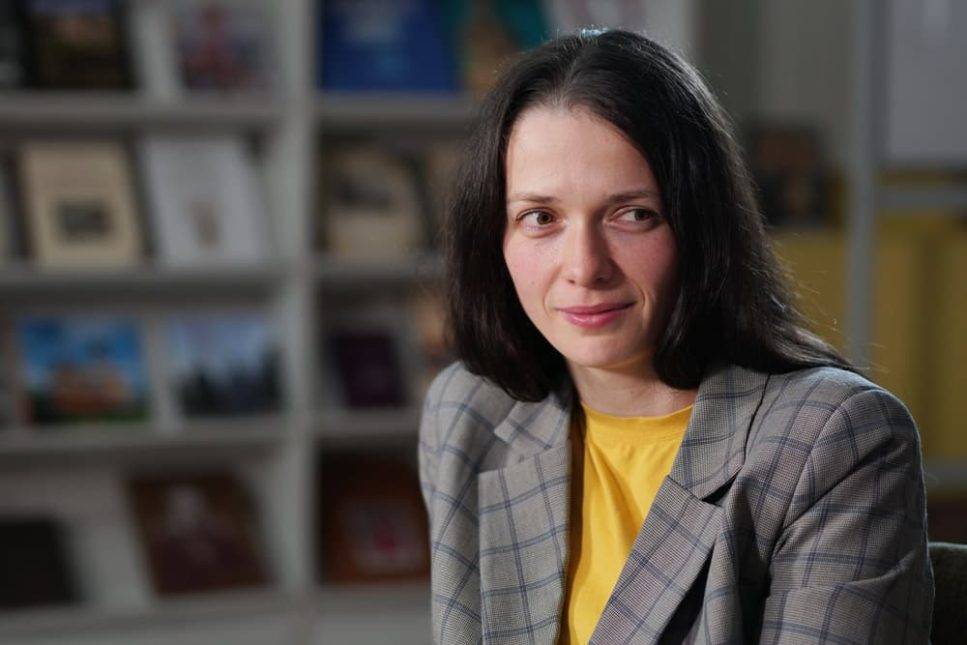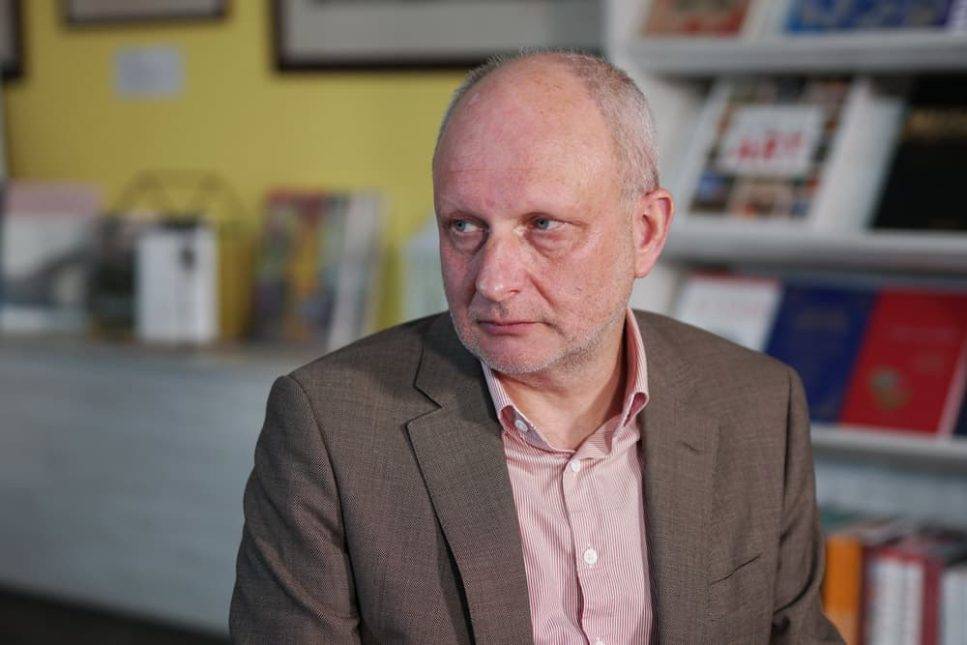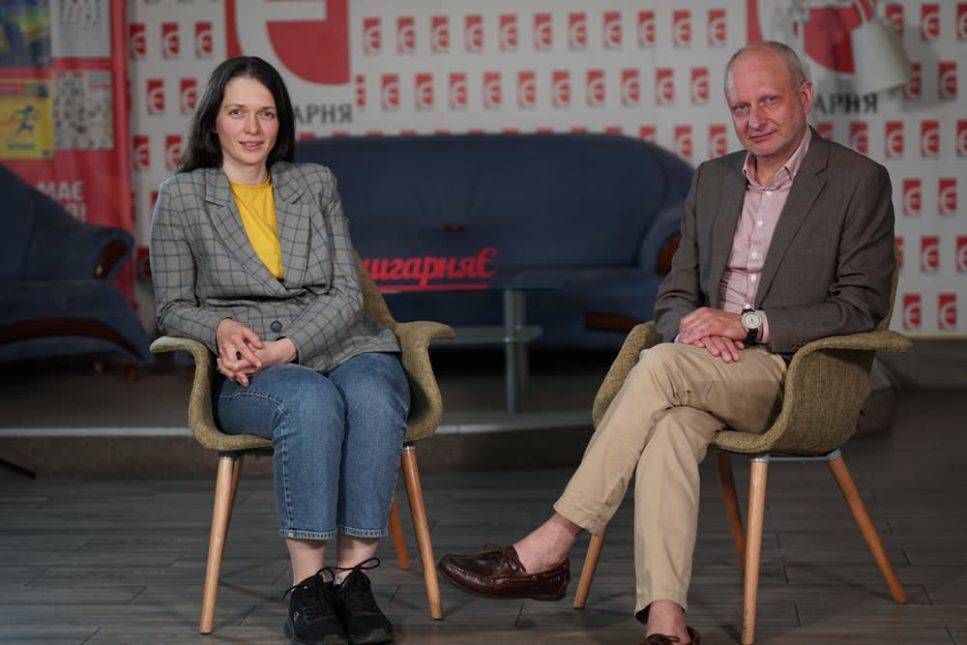
EU Ambassador Matti Maasikas: “The EU is not backtracking on its promises and the membership perspective is a promise”
— I would like to start with perhaps the most horrific war crime that has occurred since the beginning of the war, the Kakhovka dam crash. The EU has already started to send aid to Ukraine. Just now I have seen a Sky News report that said that there are rescuers from Ukraine, volunteers, but very few foreign rescuers on the ground. Are EU countries planning to send rescuers from their countries to help the people of Kherson region tackle this catastrophe? In addition, this war crime will have long-term consequences. Are there any discussions on how to tackle these long-term consequences on the EU level?
— It is indeed catastrophic, and it is unequivocally a result of the Russian occupation and Russia’s war and the sad consequence of Russia’s attacks on Ukrainian civil infrastructures. We are seeing and we will be seeing all the proportions of the damage done, and we will do everything that we can as the EU and as international partners.
The European Union’s civil protection mechanism (of which Ukraine is a member now as well) has been triggered immediately. First pledges by Germany, Austria, Lithuania were made and the help is there. We are working. For you to understand and to answer your question, whether different international aid workers will be there, we are working according to the Ukrainian requests. And should there be requests for concrete manpower, I am sure that this will be considered as well.
But so far the first requests were about water, definitely food, and water pumps. These have been pledged already by several member states and I am sure there is more to come.
— And concerning the long-term consequences, have there already started discussions? Or are you now focusing on the short-term issues which have to be tackled in the next days?
— We are on the third day since the disaster happened. We need to see, and again Ukrainian authorities who have the best picture and who have the best analysis of the needs will be in the lead. I am convinced that there will be long-term assistance as well.

— Just recently, on the 1st of June, the second summit of the European political community took place in Moldova. And I do remember that last year there were rather sceptical discussions concerning this idea. Yet I think after this year’s meeting, views somehow changed. So, how do you personally see the idea of European political community concept?
— All the scepticism is gone. You are quite right. It is very important to understand what the European Political Community is and what it is not. It is a wonderful forum for broader discussions on security and stability on the whole continent. You know very well that not all (should I say, unfortunately) countries that are geographically in Europe belong to the EU. And I think it was a very smart move to create such a discussion platform at the highest level so that not only EU countries and the EU institutions, but also countries like the United Kingdom, Turkey, not to speak, of course, of Ukraine, can meet and discuss these issues. Formally there was no such forum. But what the European Political Community is not, — it is no substitute for EU’s enlargement policy. It is not like, you come once a year or twice a year and discuss with us and then you do not need the membership. No, no, no. Ukraine is an enlargement country now. It is a candidate country. And this enlargement or membership promise stays.
“It is very important to understand what the European Political Community is and what it is not. It is a wonderful forum for broader discussions on security and stability on the whole continent… But what the European Political Community is not, — it is no substitute for EU’s enlargement policy.”
— Do you see the consensus among the EU members concerning the membership of Ukraine? And if there is no consensus, then what creates the split?
— All enlargement related issues in the EU are being decided by consensus among member states. And it is logical because the EU is a voluntary club where sovereign countries have joined, pooling and sharing some of their sovereignty. So, it is a very big decision. When you are in this club, of course, joining of any newcomers must be okay for all existing members. That is why all these decisions are being taken by consensus. All the decisions related to Ukraine’s candidate status so far, of course, have been taken by consensus. It is clear and will be, because they will have to. The level of popular democratic support among EU member states citizens towards all the assistance to Ukraine is very high, and has remained high. I know that there were fears of a normalization of the situation. This has not happened and I am very proud and happy about that. EU citizens continue to support humanitarian assistance, military assistance and also political support towards Ukraine. No enlargement-related discussion is ever easy in the EU, but I’m sure that with the Ukraine’s homework (because the vast majority of the accession process consists of the candidate countries’ homework) all the decisions that are needed will be taken.
Ukraine’s accession process has not only energized or re-energized the enlargement discussions within the EU, but it has also given new impetus to reforms in Ukraine.
— Concerning the homework, in the end of June there should be a presentation of the verbal report by the European Commission on the process of reforms in Ukraine, Moldova and Georgia. What are your personal evaluations of the reform process that Ukraine have reached?
— Ukraine’s accession process has not only energized or re-energized the enlargement discussions within the EU, but it has also given new impetus to reforms in Ukraine. First of all, it is not a miracle, but it is something absolutely amazing that Ukrainian state and Ukrainian democracy has continued to function. One would have thought that when your country is under a full-scale invasion by a nuclear power, all you do is to fight the war, and the war you are fighting in an admirable way. But at the same time, the administration continues to work and the parliament, Verkhovna Rada, continues to meet and adopt laws and the government continues to implement them. So, it is very positive and it is crucial, of course, and one wants to proceed on the enlargement track. I think the seven recommendations that the European Union attached to its decision to grant the candidate status have helped focus minds. These are clearly defined areas with normally pretty clearly defined benchmarks of what needs to be done, and much has been achieved. There is more to do, definitely, and you are right, at the end of around the 20th of June the European Commission will report to the member states about this progress, and I am looking forward to seeing some more steps by Verkhovna Rada in the coming days. It needs to be seen.
“Ukraine’s accession process has not only energized or re-energized the enlargement discussions within the EU, but it has also given new impetus to reforms in Ukraine.”
— You have just said that Ukraine energized the process of the accession. There is a fear that at some point this enlargement process will get less energy, and then we will stay as a candidate for years. How can we make this process energized for enough time, so that to become a member?
— By dedication and homework, and by not worrying that much of whether you will be accepted in the end. Do not worry about that. The EU is not backtracking on its promises and the membership perspective is a promise.
I know there have been doubts when one thinks of the enlargement policy of the EU over the last maybe 15 years, after the fifth enlargement, when mostly Central Eastern European countries entered. But now, also thanks to Ukraine, this policy has acquired more energy.
But, as I said, a vast majority of the work that is needed will have to be done by the candidate country. Accession process to the EU is about adopting EU legislation, implementing it, adopting all the regulations, rules, and standards to be ready to operate as a member state. And here, of course, the EU helps, assists, and also including with money.
But the main work is on the candidate country side.

— Before the full-scale invasion there was a visible division between the countries in the EU who were very attentive to the Russian threat and who were warning about it and those who either did not want to see it or just did not take it as serious as it was. I think this division is now rather in the past or is it, in your opinion? Are there any other visible splits between the EU countries now?
— The EU is completely united in its response to this horrible war. Because the situation is so grave; a nuclear power country attacks its neighbour in Europe without any provocation, without any justification. That is such a grave and clear thing, that the unity is 100% there. Yes, before the full-scale invasion, there were different assessments on the Russian threat. And I do not shy away from saying that when history will be written and when the EU’s foreign policy will be assessed, underestimation of the Russian threat will be among the biggest mistakes. It has been acknowledged already now. Leaders like President of the European Commission Ursula von der Leyen, Prime Minister of Finland Sanna Marin, President of France Emmanuel Macron recently in Bratislava and others have all acknowledged that the EU as a whole should have listened more to those warnings. But what comes now, of course, is more for historians, but also for actual practitioners of foreign policy to plan some new plan of post-war policies. What counts now is this remarkable unity, this common assessment of the situation.
“And I do not shy away from saying that when history will be written and when the EU’s foreign policy will be assessed, underestimation of the Russian threat will be among the biggest mistakes. It has been acknowledged already now.”
— Since almost the start of the full-scale invasion there were talks concerning the reconstruction of Ukraine and how it will look like. Do you expect that there might be the united plan for reconstruction as the Marshall Plan was? Will there be any body or person who will coordinate this reconstruction process and the aid that will be coming in? Or will these be different initiatives from different countries?
— Let me turn the question around a bit, if you will. The most important thing with the reconstruction is that the Ukrainian authorities have a plan. A clear assessment, the list of damages, the priorities of what needs to be done and in which order needs to be restored. On the donors side, the donors coordination platform where Ukraine is a full-fledged member has been set up early this year. This platform has a secretariat. It is meeting frequently.
And I may say that on the fast recovery, meaning for this year needs for the critical infrastructure, there are results that are pretty encouraging in terms of pledging money. Ukraine participates in all these discussions, and Ukrainians also know what needs to be done, what plans need to be presented. On the long-term recovery after the victory, it is hard at this stage to predict how exactly it will look like. It is an exercise where nobody has an experience. Hundreds of billions of dollars or euros are needed, coming from different sources. The aggressor must also pay. The whole process needs to ensure a very strong Ukrainian by-in. Nobody wants to come to Ukraine and say I have this money and for this you need to rebuild this, this and this. It all needs to go according to the Ukrainian plans. I think this experience that we are now having with the Coordination platform helps us to prepare for the future as well.
“On the long-term recovery after the victory, it is hard at this stage to predict how exactly it will look like. It is an exercise where nobody has an experience. Hundreds of billions of dollars or euros are needed, coming from different sources.”
— There will always be an issue of clarity of how the funds are used. Are there any discussions and plans how to check how much clear the funds are used and whether there is no corrupted schemes or issues on that?
— As far as I can see now personally from Kyiv, there will be thousands of issues that we need to solve. There are, of course, the principles of the reconstruction from Lugano conference last year, and indeed this reconstruction will enable to build back better, greener, more sustainable. The fact that I want to underline is that the reconstruction and using this money will go hand in hand with the EU related reforms. When you advance on your membership path, the European Union affects or deals with so many various areas of life. And for instance, environmental standards are very high there or the standards of the work of energy system.

We can rebuild using these EU funds and also using a very clear roadmap in the form of the EU laws and standards. Now, to your question, two very important issues that I see personally here in Kyiv. First, the corruption risk that you mentioned. We need absolutely ensure that these are mitigated, not least for the credibility of the process. Both in the eyes of the Ukrainian citizens and the citizens of the donor countries. And our experts are working already with the Ministry of Infrastructure, with Mustafa Nayem’s Reconstruction Agency, in order to put in place rules and procedures that would ensure that the corruption risks are mitigated.
Then, the other mega issue here, as far as I can see from Kyiv, is a good plan that ensures fair distribution all across the country. So, not only a good technical groundwork, but also that it is fair, that people see that no area is neglected, that people understand why this object will be rebuilt, and another — will not. It’s enormously important.
— So, does it mean that these funds will also be distributed to the regions which are not as strongly affected by Russian invasion, like the West of Ukraine?
— It is far too early to say. And here we are looking forward to having good plans by the Ukrainian authorities, of course, bearing in mind that at the moment this is not possible.
Unfortunately, every day the damages grow. No, I cannot answer, and I don’t want to answer on any particular region. But in a broader sense, fair distribution, also ensuring democratic support within Ukraine to this whole process, this needs to be done rightly.
— There are a lot of visions of how the process of reconstruction should look like — on the US side, on the G7 side, on the EU side, though they are, of course, based on what Ukraine wants and needs. There is also a Coordination Platform, but still, in your opinion, how is it possible to avoid chaos?
— By working together every day, we learn to know each other better. We learn everyday things that we need to know in order to have an effective reconstruction process. I think the current coordination that is ongoing on this platform, and which is evolving is very important. Sometimes, more countries take part in the discussions, international financial institutions take part in these discussions. I am sure that there will be no chaos. The Coordination platform is not a fund. And definitely not all money will be channelled through it. But it will ensure our common understanding of what and how needs to be done.
Media, Publications
-
Respect and recognition
-
Eurobarometer shows strong support for Ukraine
-
New EU Strategy for the Black Sea Region
-
EU and UNDP in Ukraine transfer equipment to Lubny Medical College and Lubny City Primary Health Care Center
-
Happy birthday, invincible capital!
-
Justice matters most when people can feel it working